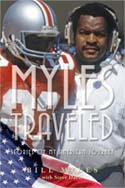He’s dead. Those words title the very first story in Chapter 14 of Myles Traveled. Fifty years ago today Coach Myles was driving some of his players home from practice. They were at the corner of Thirty-First and Indiana, a block from Central High School, in Kansas City Missouri, when word came over the radio. Dr. King had been shot. They drove a few blocks. “He’s dead,” the players gasped.
As I watched the coverage of Dr. King this morning, on the Fiftieth Anniversary of his passing, I thought back to the day I sat and listened to Coach Myles tell me that story. And I thought how Bill’s experiences, and his life, helped me tell not only a sports story, but a story exemplifying the ideals of Dr. King, and the struggle of this nation to reach those ideals.
I also thought back to a more recent time, just two weeks ago tomorrow. I was at a meeting and afterwards a man came up to me. At first I didn’t recognize him, but then I remembered, when he told me I had sold him a book almost two year ago. “I want to tell you,” he said, “how much I loved the book.” More importantly, he went on to say, “I wanted you to know how much my two sons loved it too. We all just loved it, and I am so thrilled that they could read it.”
The gentleman has two sons in high school. We talked and I could see that as a father he was proud, not only that he could share the message of Myles Traveled with his sons, but more importantly that at that impressionable age, they received it. The ole Coach is still teaching. It was a proud moment not only for that father, but for this author. What greater compliment than to know you have passed the wisdom and teachings of Coach Myles on to the next generation.
It is the same this morning with Dr. King. As the nation mourns the anniversary of his death, the retelling of his life recommits all of us to the ideals of freedom, equality and justice for all.
Both of these things give us hope.
